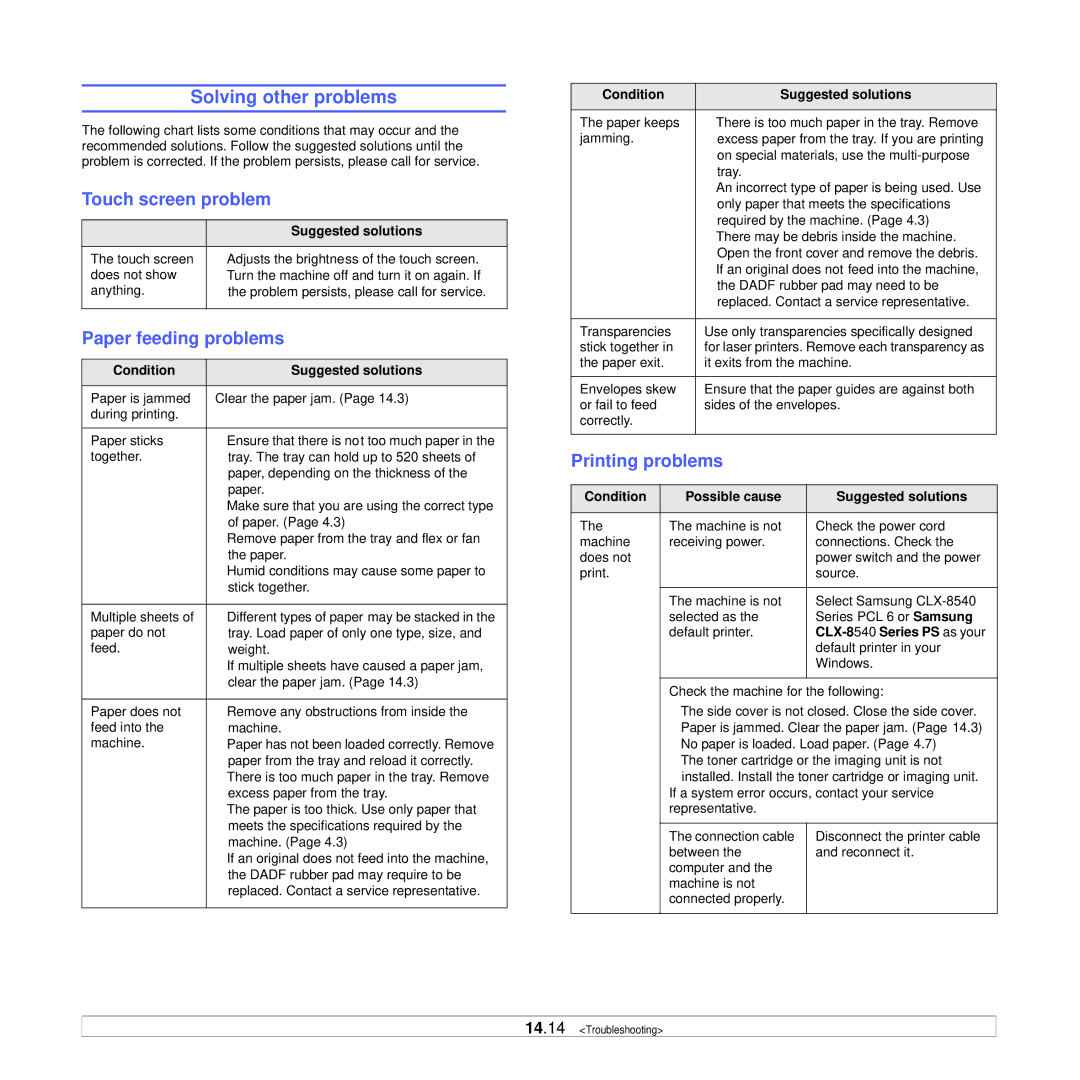
Solving other problems
The following chart lists some conditions that may occur and the recommended solutions. Follow the suggested solutions until the problem is corrected. If the problem persists, please call for service.
Touch screen problem
Condition |
| Suggested solutions |
|
|
|
The touch screen | • | Adjusts the brightness of the touch screen. |
does not show | • | Turn the machine off and turn it on again. If |
anything. |
| the problem persists, please call for service. |
|
|
|
Paper feeding problems
Condition |
| Suggested solutions |
|
| |
Paper is jammed | Clear the paper jam. (Page 14.3) | |
during printing. |
|
|
|
|
|
Paper sticks | • | Ensure that there is not too much paper in the |
together. |
| tray. The tray can hold up to 520 sheets of |
|
| paper, depending on the thickness of the |
|
| paper. |
| • | Make sure that you are using the correct type |
|
| of paper. (Page 4.3) |
| • | Remove paper from the tray and flex or fan |
|
| the paper. |
| • | Humid conditions may cause some paper to |
|
| stick together. |
|
|
|
Multiple sheets of | • | Different types of paper may be stacked in the |
paper do not |
| tray. Load paper of only one type, size, and |
feed. |
| weight. |
| • | If multiple sheets have caused a paper jam, |
|
| clear the paper jam. (Page 14.3) |
|
|
|
Paper does not | • | Remove any obstructions from inside the |
feed into the |
| machine. |
machine. | • | Paper has not been loaded correctly. Remove |
|
| paper from the tray and reload it correctly. |
| • | There is too much paper in the tray. Remove |
|
| excess paper from the tray. |
| • | The paper is too thick. Use only paper that |
|
| meets the specifications required by the |
|
| machine. (Page 4.3) |
| • | If an original does not feed into the machine, |
|
| the DADF rubber pad may require to be |
|
| replaced. Contact a service representative. |
|
|
|
Condition |
| Suggested solutions |
|
|
|
The paper keeps | • | There is too much paper in the tray. Remove |
jamming. |
| excess paper from the tray. If you are printing |
|
| on special materials, use the |
|
| tray. |
| • | An incorrect type of paper is being used. Use |
|
| only paper that meets the specifications |
|
| required by the machine. (Page 4.3) |
| • | There may be debris inside the machine. |
|
| Open the front cover and remove the debris. |
| • | If an original does not feed into the machine, |
|
| the DADF rubber pad may need to be |
|
| replaced. Contact a service representative. |
|
| |
Transparencies | Use only transparencies specifically designed | |
stick together in | for laser printers. Remove each transparency as | |
the paper exit. | it exits from the machine. | |
|
| |
Envelopes skew | Ensure that the paper guides are against both | |
or fail to feed | sides of the envelopes. | |
correctly. |
|
|
|
|
|
Printing problems
Condition | Possible cause | Suggested solutions |
|
|
|
The | The machine is not | Check the power cord |
machine | receiving power. | connections. Check the |
does not |
| power switch and the power |
print. |
| source. |
|
|
|
| The machine is not | Select Samsung |
| selected as the | Series PCL 6 or Samsung |
| default printer. |
|
|
| default printer in your |
|
| Windows. |
|
|
|
Check the machine for the following:
•The side cover is not closed. Close the side cover.
•Paper is jammed. Clear the paper jam. (Page 14.3)
•No paper is loaded. Load paper. (Page 4.7)
•The toner cartridge or the imaging unit is not installed. Install the toner cartridge or imaging unit.
If a system error occurs, contact your service representative.
| The connection cable | Disconnect the printer cable |
| between the | and reconnect it. |
| computer and the |
|
| machine is not |
|
| connected properly. |
|
|
|
|
